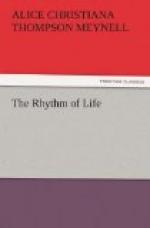Take, as an instance, Mr. Swinburne’s ‘hell.’ There is, I fear, no doubt whatever that Mr. Swinburne has put his ‘hell’ into a vocabulary, with the inevitable consequences to the word. And when the minor men of his school have occasion for a ‘hell’ (which may very well happen to any young man practising authorship), I must not be accused of phantasy if I say that they put their hands into Mr. Swinburne’s vocabulary and pick it. These vocabularies are made out of vigorous and blunt language. ‘What hempen homespuns have we swaggering here?’ Alas, they are homespuns from the factory, machine-made in uncostly quantities. Obviously, power needs to make use of no such storage. The property of power is to use phrases, whether strange or familiar, as though it created them. But even more than lack of power is lack of humour the cause of all the rankness and the staleness, of all the Anglo-Saxon of commerce, of all the weary ’quaintness’—that quaintness of which one is moved to exclaim with Cassio: ‘Hither comes the bauble!’ Lack of a sense of humour betrays a man into that perpetual too-much whereby he tries to make amends for a currency debased. No more than any other can a witty writer dispense with a sense of humour. In his moments of sentiment the lack is distressing; in his moments of wit it is at least perceptible. A sense of humour cannot be always present, it may be urged. Why, no; it is the lack of it that is—importunate. Other absences, such as the absence of passion, the absence of delicacy, are, if grievous negatives, still mere negatives. These qualities may or may not be there at call, ready for a summons; we are not




